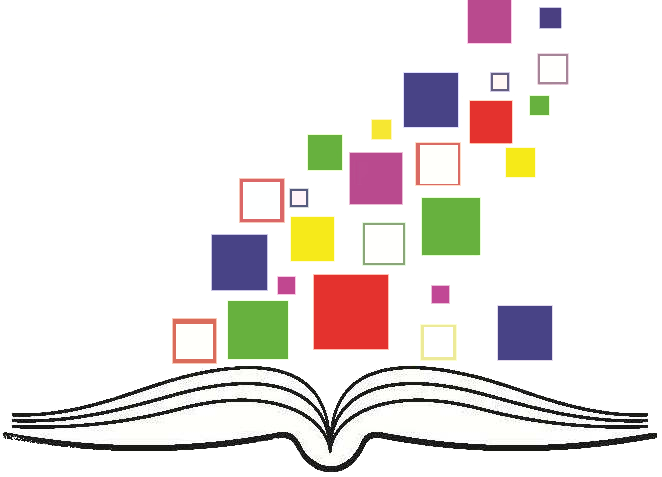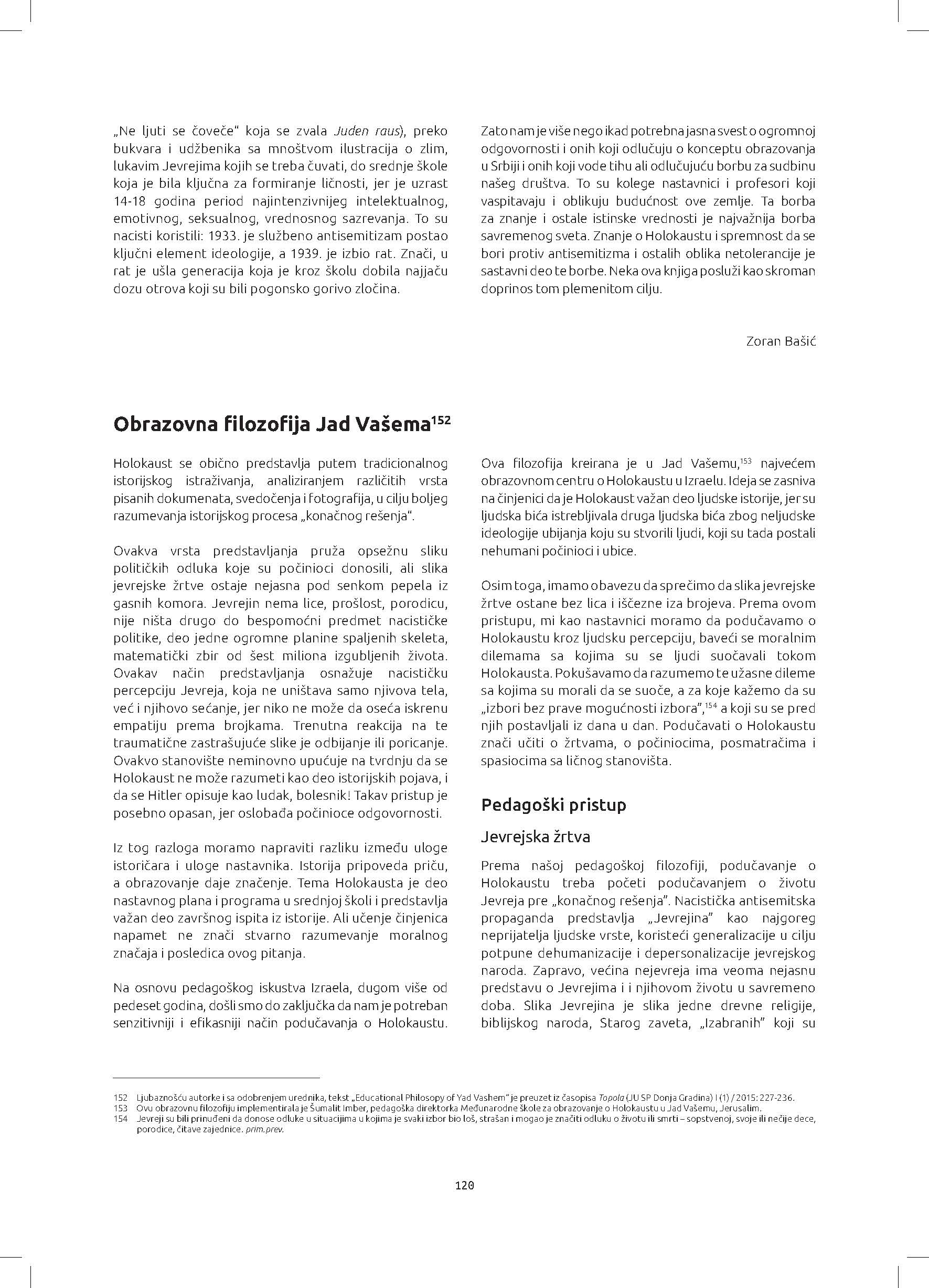Приказ основних података о документу
Obrazovna filozofija Jad Vašema
The educational philosophy of Yad Vashem
| dc.contributor | Minčev, Višnja | |
| dc.creator | Baruh, Hava | |
| dc.date.accessioned | 2024-03-27T13:24:52Z | |
| dc.date.available | 2024-03-27T13:24:52Z | |
| dc.date.issued | 2019 | |
| dc.identifier.isbn | 978-86-86001-87-0 | |
| dc.identifier.uri | https://www.jevrejskadigitalnabiblioteka.rs/handle/123456789/2720 | |
| dc.description.abstract | Holokaust se obično predstavlja putem tradicionalnog istorijskog istraživanja, analiziranjem različitih vrsta pisanih dokumenata, svedočenja i fotografija, u cilju boljeg razumevanja istorijskog procesa „konačnog rešenja“. Ovakva vrsta predstavljanja pruža opsežnu sliku političkih odluka koje su počinioci donosili, ali slika jevrejske žrtve ostaje nejasna pod senkom pepela iz gasnih komora. Jevrejin nema lice, prošlost, porodicu, nije ništa drugo do bespomoćni predmet nacističke politike, deo jedne ogromne planine spaljenih skeleta, matematički zbir od šest miliona izgubljenih života. Ovakav način predstavljanja osnažuje nacističku percepciju Jevreja, koja ne uništava samo njivova tela, već i njihovo sećanje, jer niko ne može da oseća iskrenu empatiju prema brojkama. Trenutna reakcija na te traumatične zastrašujuće slike je odbijanje ili poricanje. Ovakvo stanovište neminovno upućuje na tvrdnju da se Holokaust ne može razumeti kao deo istorijskih pojava, i da se Hitler opisuje kao ludak, bolesnik! Takav pristup je posebno opasan, jer oslobađa počinioce odgovornosti. Iz tog razloga moramo napraviti razliku između uloge istoričara i uloge nastavnika. Istorija pripoveda priču, a obrazovanje daje značenje. Tema Holokausta je deo nastavnog plana i programa u srednjoj školi i predstavlja važan deo završnog ispita iz istorije. Ali učenje činjenica napamet ne znači stvarno razumevanje moralnog značaja i posledica ovog pitanja. Na osnovu pedagoškog iskustva Izraela, dugom više od pedeset godina, došli smo do zaključka da nam je potreban senzitivniji i efikasniji način podučavanja o Holokaustu. Ova filozofija kreirana je u Jad Vašemu, najvećem obrazovnom centru o Holokaustu u Izraelu. Ideja se zasniva na činjenici da je Holokaust važan deo ljudske istorije, jer su ljudska bića istrebljivala druga ljudska bića zbog neljudske ideologije ubijanja koju su stvorili ljudi, koji su tada postali nehumani počinioci i ubice. Osim toga, imamo obavezu da sprečimo da slika jevrejske žrtve ostane bez lica i iščezne iza brojeva. Prema ovom pristupu, mi kao nastavnici moramo da podučavamo o Holokaustu kroz ljudsku percepciju, baveći se moralnim dilemama sa kojima su se ljudi suočavali tokom Holokausta. Pokušavamo da razumemo te užasne dileme sa kojima su morali da se suoče, a za koje kažemo da su „izbori bez prave mogućnosti izbora”, a koji su se pred njih postavljali iz dana u dan. Podučavati o Holokaustu znači učiti o žrtvama, o počiniocima, posmatračima i spasiocima sa ličnog stanovišta. | sr |
| dc.description.abstract | The Holocaust is usually presented through traditional historical research, analyzing various types of written documents, testimonies and photographs, to better understand the historical process of the "Final Solution". This type of presentation provides a comprehensive picture of the political decisions made by the perpetrators, but the picture of the Jewish victim remains unclear under the shadow of the ashes from the gas chambers. The Jew has no face, no past, no family, he is nothing more than a helpless object of Nazi policy, part of a huge mountain of burned skeletons, the mathematical sum of six million lost lives. This way of presentation reinforces the Nazi perception of Jews, which not only destroys their bodies but also their memory because no one can feel sincere empathy towards the numbers. The immediate reaction to those traumatic frightening images is rejection or denial. This point of view inevitably leads to the claim that the Holocaust cannot be understood as a part of a historical phenomenon and that Hitler is described as a madman, a sick person! Such an approach is particularly dangerous because it frees the perpetrators from responsibility. For this reason, we must distinguish between the role of the historian and the role of the teacher. History tells the story and education gives meaning. The topic of the Holocaust is part of the high school curriculum and is an important part of the final history exam. However, memorizing the facts does not mean understanding the moral significance and consequences of the issue. Based on the pedagogic experience of Israel, spanning more than fifty years, we concluded that we need a more sensitive and effective way of teaching about the Holocaust. This philosophy was created at Yad Vashem, the largest Holocaust education centre in Israel. The idea is based on the fact that the Holocaust is an important part of human history because human beings exterminated other human beings because of an inhuman ideology of killing created by humans, who then became inhumane perpetrators and murderers. In addition, we should prevent the image of the Jewish victim from remaining faceless and disappearing behind the numbers. According to this approach, we as teachers must teach about the Holocaust through human perception, dealing with the moral dilemmas that people faced during the Holocaust. We are trying to understand the terrible dilemmas they had to face, which we say are "choices without real choice", and which were presented to them day after day. Teaching about the Holocaust means learning about the victims, the perpetrators, the bystanders and the rescuers from a personal point of view. | sr |
| dc.language.iso | sr | sr |
| dc.publisher | Beograd : Grupa 484 | sr |
| dc.rights | openAccess | sr |
| dc.rights.uri | https://creativecommons.org/licenses/by-nc-nd/4.0/ | |
| dc.source | To što radiš važno je: učiti o Holokaustu po preporukama Jad Vašema | sr |
| dc.subject | Jad Vašem - edukativna filozofija | sr |
| dc.subject | Jad Vašem - obrazovanje | sr |
| dc.subject | Holokaust - obrazovanje | sr |
| dc.subject | Yad Vashem - educational philosophy | sr |
| dc.subject | Yad Vashem - education | sr |
| dc.subject | Holocaust - education | sr |
| dc.title | Obrazovna filozofija Jad Vašema | sr |
| dc.title | The educational philosophy of Yad Vashem | sr |
| dc.type | bookPart | sr |
| dc.rights.license | BY-NC-ND | sr |
| dc.identifier.fulltext | http://jevrejskadigitalnabiblioteka.rs/bitstream/id/8691/ObrazovnaFilozofijaJadVasemaHavaBaruhOCR.pdf | |
| dc.type.version | publishedVersion | sr |
| dc.citation.spage | 120 | |
| dc.citation.epage | 124 | |
| dc.description.other | Originalni tekst na engleskom jeziku objavljen je u "Topola: časopis JU Spomen-područja Donja Gradina", god. 1, br. 1, (2015), str. 227-236 i može se preuzeti preko linka (The original text in English was published in "Topola: magazine JU Spomen-područja Donja Gradina", vol. 1, no. 1, (2015), p. 227-236 and can be downloaded via the link) [https://jevrejskadigitalnabiblioteka.rs/handle/123456789/2707] | sr |
| dc.identifier.rcub | https://hdl.handle.net/21.15107/rcub_jdb_2720 |

